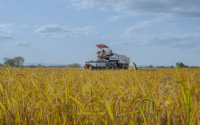Tanzania: young and in love with farming as business
By Angel Navuri
After college education, not many young people in Tanzania would willingly chose to be farmers as a career choice due to the doggy peasantry tag associated with agriculture.
The situation has been so dire, such that, to turn the tide, the government last year came up with a National Strategy for Youth Involvement in Agriculture (NSYIA 2016-20121).
A few go against the norm. Instead of going to big towns in search of white collar jobs, they chose farming, as a way of life, and not on subsistence basis, but for commercial gain.
Mr Herman Shirima(27) of Wanging’ombe Village in Iringa Region, is not even aware of the strategy document. But he has happily chosen agribusiness in the heart of the village as a career, which he wants to advance to big heights.
After graduating early last year with diploma in crop production at the Ministry of Agriculture Training Institute – Uyole (Mbeya), he decide to go back to the village to practise what he had learnt. “I know from the word go that there is money in smart farming, all what is needed is hard work and patience,” he says.
He does mixed farming- maize, beans, cowpea and vegetables. Thanks to his education, he has become an informal extension officer in the village.
Shirima is grateful for the capacity building he has received several times from Building Rural Incomes Through Enterprise (BRiTEN), which in turn is funded by Alliance for a Green Revolution in Africa (AGRA), to support farmers’ group maximise yield through best practises along the agriculture value chain.
“We have learnt a lot about best practices in maize farming- from preparing the soil, seeds, planting, harvesting and storage that prevents post harvest losses- the same things I learnt at college but now more practically. It has been a great journey,” Mr Shirima notes.
For maize storage he says he is among the many villagers who stock their produce with PIC bags that were introduced by AGRA in the area.
An old hand farmer, Mr Issa Twaire Kimaru of neighbouring Mbuyuni village, also the leader of Ukombozi Group, notes that Mr Shirima has become an inspiration to them.
“When the new storage technology was introduced for grains, many people thought the bags had hidden chemicals, that were killing pests. For sometimes the villagers thought for grains not to be attacked by pest it was paramount to use chemicals. It took a lot of efforts for BRiTEN to convince them,” he notes, adding that at the moment, Mr Shirima is able to explain to farmers more clearly about such issues, and he does it at no pay.
For the young man, agriculture pays. The first season he made some losses as he did not use PiC bags. After a neighbor introduced him to BRiTEN organised training, things have greatly improved.
The youngman says with farming (at the moment 2 acres), he has started buying building materials . “I have increased my income. I also feel greatly valued by my community as I share the knowledge I got from college with them.”
In Mlimba Village, Kilombero there is another graduate, whose ambition of living and working in the remote villages he was born, has become true. Mr Renatus Anthony Danda graduated in 2013 at the University of Dodoma (UDOM) with a Bachelor degree in Project Planning and Management.
He headed to his home village- Mlimba, which suffers from lack of key services like banking services and reliable means of transportation.
“I decided I was not going to follow the tide and immigrate to big towns to look for a job, I wanted to be a farmer,” says the 5th born child in a family of 8, where he is the only one who has managed to study beyond primary school.
He pities his college mates who are still tarmacing in big cities. “The competition for jobs in towns is stiff. With thousands running there in search of green pasture. Graduates forget that in the villages too there are opportunities for self employment in agriculture,” he says.
In 2014 at a village assembly a new project which was being financed by Alliance for Green Revolution in Africa (AGRA) was introduced.
Renatus listened carefully what the project was all about. Named Farmers Organizations Capacity Enhancement Project(FOCEP), he felt that some of the issues it articulated were what he had silently been looking for, especially farmers organizations.
When the villagers were asked to organise themselves into farmers grounds at various levels, he was at the forefront in persuading them that it was a good thing. He became a chairperson of one of the groups, and eventually a executive committee member of a farmers’ group apex body, they had established, called AMRIGO.
“All my farming activities have been profitable…. All is needed is good agricultural practices, and a lot of patience,” he says.
The government of Tanzania developed the NSYIA to track the involvement of youth and graduates for agriculture transformation. According to the document the overall economic participation of youth in Tanzania is poor despite each year over 900,000 young Tanzanians entering the a job market. Youths participation in agriculture is key for a stable economic future.

